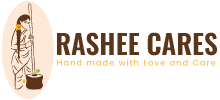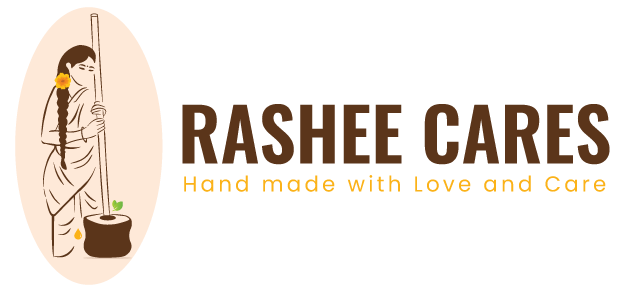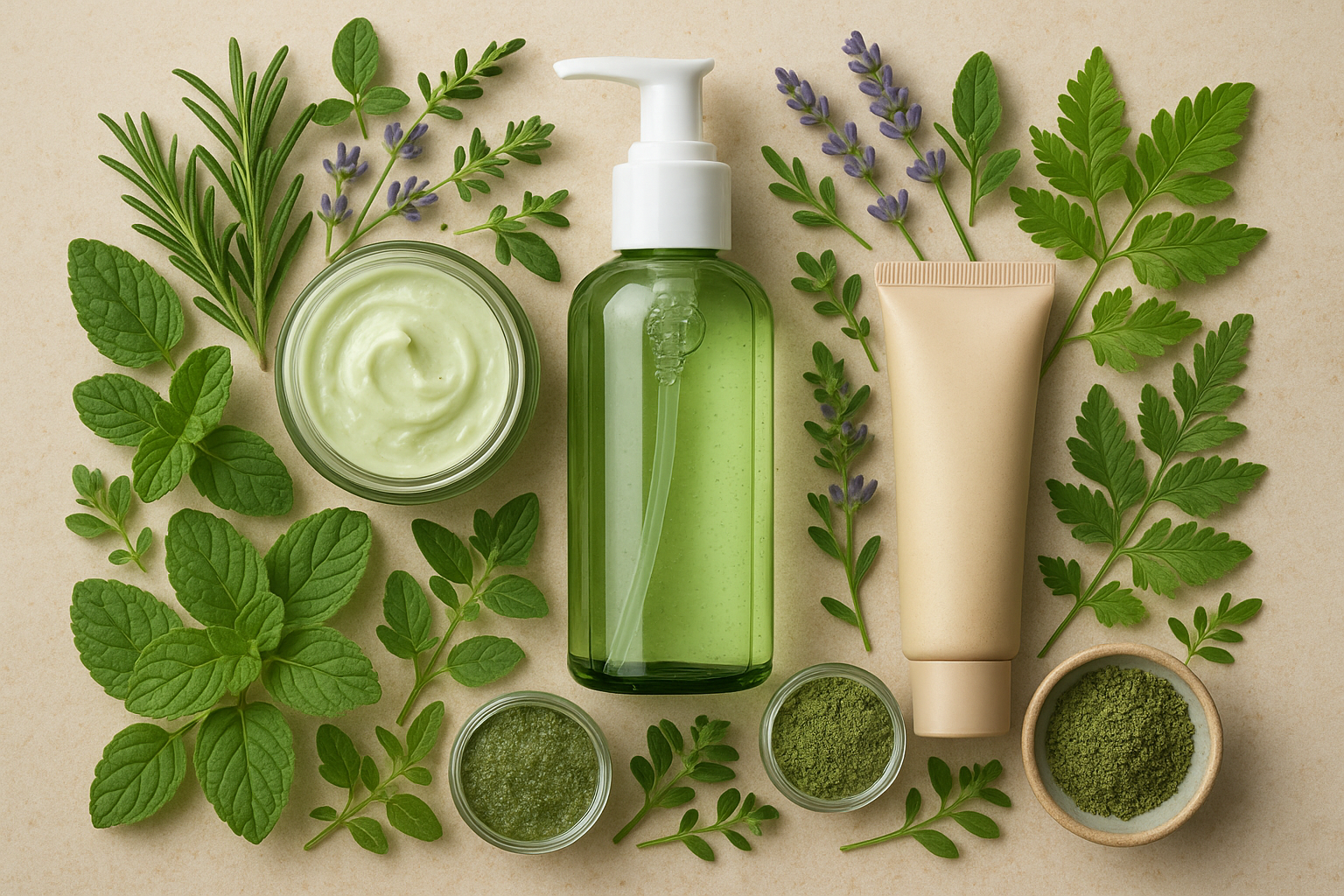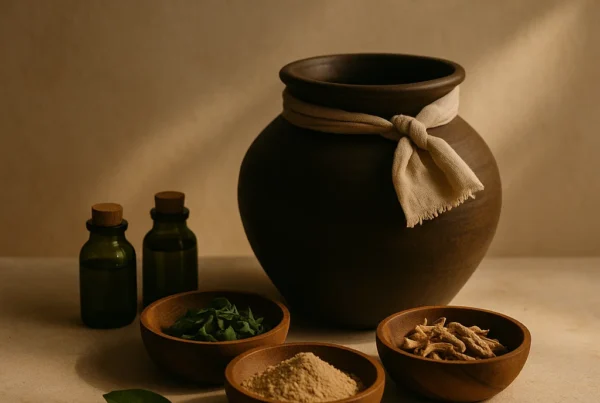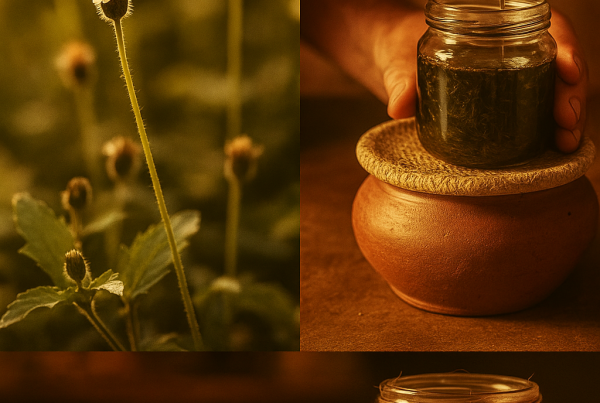What Is Herbal Skincare? A Beginner’s Guide to Natural Beauty Rituals
If you’ve ever paused mid-aisle at a store, scanning the labels of “natural” skincare, you’re not alone. As more people seek chemical-free options, herbal skincare is gaining attention—but what does it actually mean?
At Rashee Cares, we believe in rituals that are grounded in tradition and ingredients that are as honest as they are effective. This beginner’s guide breaks down everything you need to know about herbal skincare, so you can make empowered choices for your skin and your lifestyle.[/vc_column_text][/vc_column][/vc_row][vc_row type=”in_container” full_screen_row_position=”middle” column_margin=”default” column_direction=”default” column_direction_tablet=”default” column_direction_phone=”default” scene_position=”center” text_color=”dark” text_align=”left” row_border_radius=”none” row_border_radius_applies=”bg” overflow=”visible” overlay_strength=”0.3″ gradient_direction=”left_to_right” shape_divider_position=”bottom” bg_image_animation=”none”][vc_column column_padding=”no-extra-padding” column_padding_tablet=”inherit” column_padding_phone=”inherit” column_padding_position=”all” column_element_direction_desktop=”default” column_element_spacing=”default” desktop_text_alignment=”default” tablet_text_alignment=”default” phone_text_alignment=”default” background_color_opacity=”1″ background_hover_color_opacity=”1″ column_backdrop_filter=”none” column_shadow=”none” column_border_radius=”none” column_link_target=”_self” column_position=”default” gradient_direction=”left_to_right” overlay_strength=”0.3″ width=”1/1″ tablet_width_inherit=”default” animation_type=”default” bg_image_animation=”none” border_type=”simple” column_border_width=”none” column_border_style=”solid”][vc_column_text]
What Does “Herbal Skincare” Actually Mean?
Herbal skincare refers to products made using whole plant ingredients—leaves, roots, flowers, seeds—processed in traditional ways to retain their healing properties. Unlike synthetic or even some “greenwashed” products, herbal skincare is rooted in time-tested wisdom, especially Ayurveda.
Key Characteristics:
- Uses botanical extracts like neem, tulsi, hibiscus, or aloe vera.
- Avoids synthetic preservatives, dyes, and fragrances.
- Often produced in small batches for freshness.
- Relies on minimal processing: cold-pressing, sun-drying, or fire-heating.
Herbal skincare is not just a label; it’s a commitment to simplicity, transparency, and skin compatibility.
According to a study published in the Journal of Pharmaceutical Research International, herbal cosmetics are preferred due to their bio-compatibility and low risk of side effects (JPRI, 2021).[/vc_column_text][/vc_column][/vc_row][vc_row type=”in_container” full_screen_row_position=”middle” column_margin=”default” column_direction=”default” column_direction_tablet=”default” column_direction_phone=”default” scene_position=”center” text_color=”dark” text_align=”left” row_border_radius=”none” row_border_radius_applies=”bg” overflow=”visible” overlay_strength=”0.3″ gradient_direction=”left_to_right” shape_divider_position=”bottom” bg_image_animation=”none”][vc_column column_padding=”no-extra-padding” column_padding_tablet=”inherit” column_padding_phone=”inherit” column_padding_position=”all” column_element_direction_desktop=”default” column_element_spacing=”default” desktop_text_alignment=”default” tablet_text_alignment=”default” phone_text_alignment=”default” background_color_opacity=”1″ background_hover_color_opacity=”1″ column_backdrop_filter=”none” column_shadow=”none” column_border_radius=”none” column_link_target=”_self” column_position=”default” gradient_direction=”left_to_right” overlay_strength=”0.3″ width=”1/1″ tablet_width_inherit=”default” animation_type=”default” bg_image_animation=”none” border_type=”simple” column_border_width=”none” column_border_style=”solid”][vc_column_text]
Why Are More People Switching to Herbal Skincare?
The shift isn’t just about “natural vs. chemical.” It’s about trust, long-term results, and skin that thrives.
[/vc_column_text][/vc_column][/vc_row][vc_row type=”in_container” full_screen_row_position=”middle” column_margin=”default” column_direction=”default” column_direction_tablet=”default” column_direction_phone=”default” scene_position=”center” text_color=”dark” text_align=”left” row_border_radius=”none” row_border_radius_applies=”bg” overflow=”visible” overlay_strength=”0.3″ gradient_direction=”left_to_right” shape_divider_position=”bottom” bg_image_animation=”none”][vc_column column_padding=”no-extra-padding” column_padding_tablet=”inherit” column_padding_phone=”inherit” column_padding_position=”all” column_element_direction_desktop=”default” column_element_spacing=”default” desktop_text_alignment=”default” tablet_text_alignment=”default” phone_text_alignment=”default” background_color_opacity=”1″ background_hover_color_opacity=”1″ column_backdrop_filter=”none” column_shadow=”none” column_border_radius=”none” column_link_target=”_self” column_position=”default” gradient_direction=”left_to_right” overlay_strength=”0.3″ width=”1/4″ tablet_width_inherit=”default” animation_type=”default” bg_image_animation=”none” border_type=”simple” column_border_width=”none” column_border_style=”solid”][vc_column_text]1. Fewer Irritants
Conventional skincare often includes alcohols, sulfates, and artificial scents—all of which can cause irritation or dryness. Herbal alternatives are gentler, making them ideal for sensitive skin.[/vc_column_text][/vc_column][vc_column column_padding=”no-extra-padding” column_padding_tablet=”inherit” column_padding_phone=”inherit” column_padding_position=”all” column_element_direction_desktop=”default” column_element_spacing=”default” desktop_text_alignment=”default” tablet_text_alignment=”default” phone_text_alignment=”default” background_color_opacity=”1″ background_hover_color_opacity=”1″ column_backdrop_filter=”none” column_shadow=”none” column_border_radius=”none” column_link_target=”_self” column_position=”default” gradient_direction=”left_to_right” overlay_strength=”0.3″ width=”1/4″ tablet_width_inherit=”default” animation_type=”default” bg_image_animation=”none” border_type=”simple” column_border_width=”none” column_border_style=”solid”][vc_column_text]
2. Holistic Skin Health
Herbal products aim to nourish and heal, not just treat symptoms. For example, turmeric doesn’t just brighten skin—it reduces inflammation and protects against environmental stress.[/vc_column_text][/vc_column][vc_column column_padding=”no-extra-padding” column_padding_tablet=”inherit” column_padding_phone=”inherit” column_padding_position=”all” column_element_direction_desktop=”default” column_element_spacing=”default” desktop_text_alignment=”default” tablet_text_alignment=”default” phone_text_alignment=”default” background_color_opacity=”1″ background_hover_color_opacity=”1″ column_backdrop_filter=”none” column_shadow=”none” column_border_radius=”none” column_link_target=”_self” column_position=”default” gradient_direction=”left_to_right” overlay_strength=”0.3″ width=”1/4″ tablet_width_inherit=”default” animation_type=”default” bg_image_animation=”none” border_type=”simple” column_border_width=”none” column_border_style=”solid”][vc_column_text]
3. Eco-Friendly and Ethical
Herbal skincare typically involves fewer synthetic chemicals, which means less environmental runoff. Brands like Rashee Cares also use biodegradable packaging and source ingredients responsibly.[/vc_column_text][/vc_column][vc_column column_padding=”no-extra-padding” column_padding_tablet=”inherit” column_padding_phone=”inherit” column_padding_position=”all” column_element_direction_desktop=”default” column_element_spacing=”default” desktop_text_alignment=”default” tablet_text_alignment=”default” phone_text_alignment=”default” background_color_opacity=”1″ background_hover_color_opacity=”1″ column_backdrop_filter=”none” column_shadow=”none” column_border_radius=”none” column_link_target=”_self” column_position=”default” gradient_direction=”left_to_right” overlay_strength=”0.3″ width=”1/4″ tablet_width_inherit=”default” animation_type=”default” bg_image_animation=”none” border_type=”simple” column_border_width=”none” column_border_style=”solid”][vc_column_text]
4. Rising Global and Indian Demand
India’s beauty market is increasingly turning toward herbal and Ayurvedic solutions. As highlighted in Vogue Business, Indian beauty startups and legacy brands are experiencing a surge in demand for traditional wellness rooted in herbs (Vogue Business, 2023).
The trend is mirrored globally. A review in Biomedical and Pharmacology Journal notes that Ayurvedic herbs are now recognized for their antioxidant, antimicrobial, and anti-aging benefits (PMC, 2024).[/vc_column_text][/vc_column][/vc_row][vc_row type=”in_container” full_screen_row_position=”middle” column_margin=”default” column_direction=”default” column_direction_tablet=”default” column_direction_phone=”default” scene_position=”center” text_color=”dark” text_align=”left” row_border_radius=”none” row_border_radius_applies=”bg” overflow=”visible” overlay_strength=”0.3″ gradient_direction=”left_to_right” shape_divider_position=”bottom” bg_image_animation=”none”][vc_column column_padding=”no-extra-padding” column_padding_tablet=”inherit” column_padding_phone=”inherit” column_padding_position=”all” column_element_direction_desktop=”default” column_element_spacing=”default” desktop_text_alignment=”default” tablet_text_alignment=”default” phone_text_alignment=”default” background_color_opacity=”1″ background_hover_color_opacity=”1″ column_backdrop_filter=”none” column_shadow=”none” column_border_radius=”none” column_link_target=”_self” column_position=”default” gradient_direction=”left_to_right” overlay_strength=”0.3″ width=”1/1″ tablet_width_inherit=”default” animation_type=”default” bg_image_animation=”none” border_type=”simple” column_border_width=”none” column_border_style=”solid”][vc_column_text]
Common Herbs Used in Herbal Skincare (and What They Do)
| Herb | Benefits | Found In |
| Neem | Anti-bacterial, acne-fighting | Herbal bath powders |
| Turmeric | Anti-inflammatory, skin brightening | Face packs, massage oils |
| Aloe Vera | Soothing, hydrating | After-sun gels, baby care |
| Triphala | Gentle exfoliation, anti-aging | Herbal cleansers |
| Hibiscus | Collagen-boosting, strengthens hair | Hair oils, body oils |
(Want to try them? Explore our Herbal Collection)[/vc_column_text][/vc_column][/vc_row][vc_row type=”in_container” full_screen_row_position=”middle” column_margin=”default” column_direction=”default” column_direction_tablet=”default” column_direction_phone=”default” scene_position=”center” text_color=”dark” text_align=”left” row_border_radius=”none” row_border_radius_applies=”bg” overflow=”visible” overlay_strength=”0.3″ gradient_direction=”left_to_right” shape_divider_position=”bottom” bg_image_animation=”none”][vc_column column_padding=”no-extra-padding” column_padding_tablet=”inherit” column_padding_phone=”inherit” column_padding_position=”all” column_element_direction_desktop=”default” column_element_spacing=”default” desktop_text_alignment=”default” tablet_text_alignment=”default” phone_text_alignment=”default” background_color_opacity=”1″ background_hover_color_opacity=”1″ column_backdrop_filter=”none” column_shadow=”none” column_border_radius=”none” column_link_target=”_self” column_position=”default” gradient_direction=”left_to_right” overlay_strength=”0.3″ width=”1/1″ tablet_width_inherit=”default” animation_type=”default” bg_image_animation=”none” border_type=”simple” column_border_width=”none” column_border_style=”solid”][vc_column_text]
How to Start a Herbal Skincare Routine
Switching to herbal skincare doesn’t have to be overwhelming. Start with one product at a time.
Step-by-Step:
- Choose Your Base Product: Start with a herbal cleanser or bath powder.
- Read the Ingredient Label: Look for whole herbs, not extracts or isolates.
- Do a Patch Test: Natural doesn’t mean allergy-free. Test before use.
- Give It Time: Your skin might go through a detox phase. Stick with it for 2–3 weeks.
Nature works slow, but it works deep.[/vc_column_text][/vc_column][/vc_row][vc_row type=”in_container” full_screen_row_position=”middle” column_margin=”default” column_direction=”default” column_direction_tablet=”default” column_direction_phone=”default” scene_position=”center” text_color=”dark” text_align=”left” row_border_radius=”none” row_border_radius_applies=”bg” overflow=”visible” overlay_strength=”0.3″ gradient_direction=”left_to_right” shape_divider_position=”bottom” bg_image_animation=”none”][vc_column column_padding=”no-extra-padding” column_padding_tablet=”inherit” column_padding_phone=”inherit” column_padding_position=”all” column_element_direction_desktop=”default” column_element_spacing=”default” desktop_text_alignment=”default” tablet_text_alignment=”default” phone_text_alignment=”default” background_color_opacity=”1″ background_hover_color_opacity=”1″ column_backdrop_filter=”none” column_shadow=”none” column_border_radius=”none” column_link_target=”_self” column_position=”default” gradient_direction=”left_to_right” overlay_strength=”0.3″ width=”1/1″ tablet_width_inherit=”default” animation_type=”default” bg_image_animation=”none” border_type=”simple” column_border_width=”none” column_border_style=”solid”][vc_column_text]
FAQs About Herbal Skincare
[/vc_column_text][carousel script=”flickity” flickity_formatting=”default” desktop_cols_flickity=”1″ desktop_small_cols_flickity=”1″ tablet_cols_flickity=”1″ phone_cols_flickity=”1″ flickity_controls=”default” color=”default” flickity_overflow=”hidden” flickity_wrap_around=”wrap” pagination_alignment_flickity=”default” flickity_spacing=”default” flickity_column_vertical_alignment=”default” column_padding=”0″ flickity_element_spacing=”default” border_radius=”none”][item simple_slider_bg_image_position=”default” simple_slider_overlay_strength=”0.3″ simple_slider_bg_image_loading=”default” id=”1756973282613-9″ tab_id=”1756973282615-6″ title=”Item”][vc_column_text]How long until I see results?
Usually within 2–3 weeks. Herbal skincare is not instant—it’s cumulative.
[/vc_column_text][vc_column_text] [/vc_column_text][/item][item simple_slider_bg_image_position=”default” simple_slider_overlay_strength=”0.3″ simple_slider_bg_image_loading=”default” id=”1756973282705-1″ tab_id=”1756973282705-3″ title=”Item”][vc_column_text]Can herbal skincare replace my dermatologist-prescribed routine?
It depends. For chronic conditions, consult your doctor. Herbal skincare works well for maintenance and mild concerns.
[/vc_column_text][vc_column_text] [/vc_column_text][/item][item simple_slider_bg_image_position=”default” simple_slider_overlay_strength=”0.3″ simple_slider_bg_image_loading=”default” id=”1756973282780-9″ tab_id=”1756973282780-1″ title=”Item”][vc_column_text]Is herbal skincare safe for all skin types?
Yes, but always check for personal allergens. For example, turmeric may not suit those with extremely dry skin unless balanced with ghee or oils.
[/vc_column_text][vc_column_text] [/vc_column_text][/item][/carousel][/vc_column][/vc_row][vc_row type=”in_container” full_screen_row_position=”middle” column_margin=”default” column_direction=”default” column_direction_tablet=”default” column_direction_phone=”default” scene_position=”center” text_color=”dark” text_align=”left” row_border_radius=”none” row_border_radius_applies=”bg” overflow=”visible” overlay_strength=”0.3″ gradient_direction=”left_to_right” shape_divider_position=”bottom” bg_image_animation=”none”][vc_column column_padding=”no-extra-padding” column_padding_tablet=”inherit” column_padding_phone=”inherit” column_padding_position=”all” column_element_direction_desktop=”default” column_element_spacing=”default” desktop_text_alignment=”default” tablet_text_alignment=”default” phone_text_alignment=”default” background_color_opacity=”1″ background_hover_color_opacity=”1″ column_backdrop_filter=”none” column_shadow=”none” column_border_radius=”none” column_link_target=”_self” column_position=”default” gradient_direction=”left_to_right” overlay_strength=”0.3″ width=”1/1″ tablet_width_inherit=”default” animation_type=”default” bg_image_animation=”none” border_type=”simple” column_border_width=”none” column_border_style=”solid”][vc_column_text]Final Thoughts: Herbal Skincare Is a Return to Roots
The beauty industry may evolve, but some truths stay the same: what grows in the ground often works best on our skin. Herbal skincare is not about trends; it’s about trust.
As outlined in the Siaram Ayurvedic blog, younger consumers are becoming more ingredient-conscious, embracing Ayurveda not just for heritage but for results.
If you’re tired of long ingredient lists, harsh treatments, and confusing marketing, maybe it’s time to go back to the basics. To simplicity. To herbs. To rituals.[/vc_column_text][/vc_column][/vc_row][vc_row type=”in_container” full_screen_row_position=”middle” column_margin=”default” column_direction=”default” column_direction_tablet=”default” column_direction_phone=”default” scene_position=”center” text_color=”dark” text_align=”left” row_border_radius=”none” row_border_radius_applies=”bg” overflow=”visible” overlay_strength=”0.3″ gradient_direction=”left_to_right” shape_divider_position=”bottom” bg_image_animation=”none”][vc_column column_padding=”no-extra-padding” column_padding_tablet=”inherit” column_padding_phone=”inherit” column_padding_position=”all” column_element_direction_desktop=”default” column_element_spacing=”default” desktop_text_alignment=”default” tablet_text_alignment=”default” phone_text_alignment=”default” background_color_opacity=”1″ background_hover_color_opacity=”1″ column_backdrop_filter=”none” column_shadow=”none” column_border_radius=”none” column_link_target=”_self” column_position=”default” gradient_direction=”left_to_right” overlay_strength=”0.3″ width=”1/1″ tablet_width_inherit=”default” animation_type=”default” bg_image_animation=”none” border_type=”simple” column_border_width=”none” column_border_style=”solid”][vc_column_text]
Ready to Begin?
Start with Rashee Cares’ handcrafted, small-batch herbal essentials.
Shop Herbal Skincare Collection[/vc_column_text][/vc_column][/vc_row][vc_row type=”in_container” full_screen_row_position=”middle” column_margin=”default” column_direction=”default” column_direction_tablet=”default” column_direction_phone=”default” scene_position=”center” text_color=”dark” text_align=”left” row_border_radius=”none” row_border_radius_applies=”bg” overflow=”visible” overlay_strength=”0.3″ gradient_direction=”left_to_right” shape_divider_position=”bottom” bg_image_animation=”none”][vc_column column_padding=”no-extra-padding” column_padding_tablet=”inherit” column_padding_phone=”inherit” column_padding_position=”all” column_element_direction_desktop=”default” column_element_spacing=”default” desktop_text_alignment=”default” tablet_text_alignment=”default” phone_text_alignment=”default” background_color_opacity=”1″ background_hover_color_opacity=”1″ column_backdrop_filter=”none” column_shadow=”none” column_border_radius=”none” column_link_target=”_self” column_position=”default” gradient_direction=”left_to_right” overlay_strength=”0.3″ width=”1/1″ tablet_width_inherit=”default” animation_type=”default” bg_image_animation=”none” border_type=”simple” column_border_width=”none” column_border_style=”solid”][vc_column_text]
